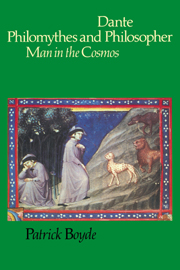Introduction: Dante and Lucretius
Published online by Cambridge University Press: 17 September 2009
Summary
Diagnosis and prescription
there is nothing new in the contention that it is impossible to separate the study of Dante's poetry from the study of his thought. Benedetto Croce did manage to persuade a whole generation of critics in Italy that the ideological framework and content of the Comedy had proved an obstacle to the free expression of Dante's poetic genius; but, in the longer term, Croce's attempt to banish content, structure and context from any discussion of the poem as poetry has only served to convince subsequent generations of their importance and indispensability. In 1980, we are no longer scornful of those early readers of the Comedy who sought to express their admiration by describing its author as ‘a supreme philosopher, although a layman’, ‘a man of piercing intellect and tenacious memory, and most assiduous in his studies’, ‘a theologian to whom no doctrine was unknown’, ‘a poetic philosopher by profession’.
The moment is, then, a propitious one, but it is still scarcely fashionable to insist, as I shall do, that Dante is first and foremost a poet of the intellectual life, or that most of the distinguishing features of his mature poetry derive from his study of philosophy. And although the sky is generally clear, so to speak, there remain some patches of cloud and mist to be dispersed.
- Type
- Chapter
- Information
- Dante Philomythes and PhilosopherMan in the Cosmos, pp. 1 - 40Publisher: Cambridge University PressPrint publication year: 1981



